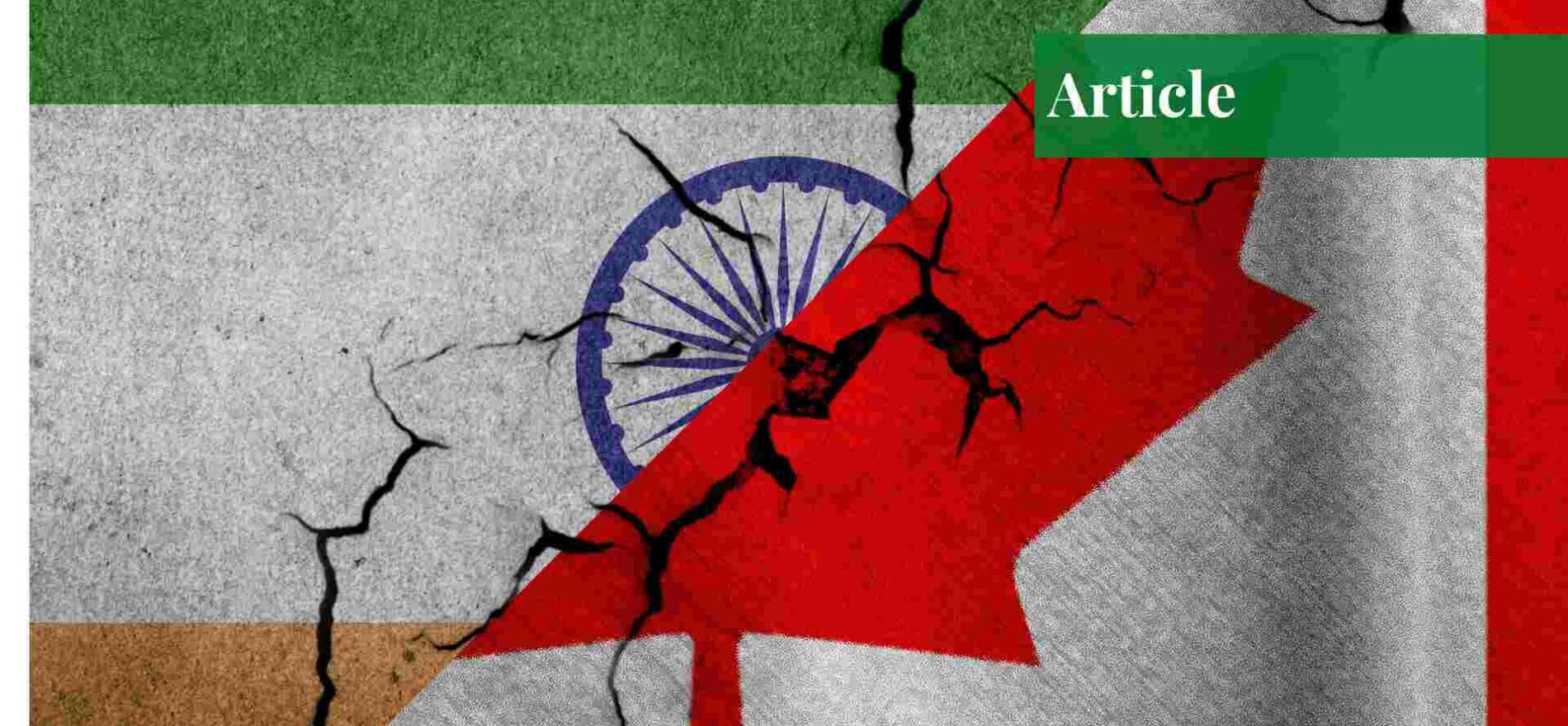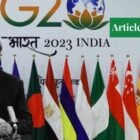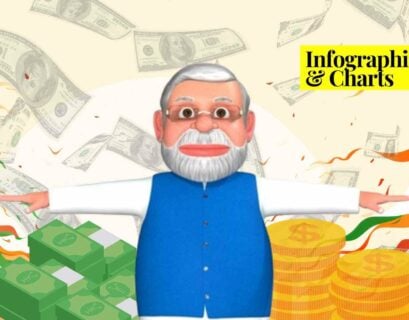Ms Alishbah Syed is pursuing her Bachelor's degree in International Relations from University of Peshawar.
The Khalistan Advocate
Hardeep Singh Nijjar was an outspoken Khalistan advocate aiming to establish an independent Sikh state in the Punjab region of India. He was reportedly organizing an unofficial referendum in India for Khalistan until his murder in Canada. Khalistan is a separatist movement outlawed in India, as evidenced by India’s National Investigation Agency (which probes terror-related crimes in the country) announcing a $1.2m reward for any information on Nijjar in July 2022.
Khalistan Movement
The movement for the ‘Land of the Pure’ originated in the aftermath of India and Pakistan’s independence in 1947. Some Sikhs advocated for a separate state during negotiations preceding the partition of the Punjab region as Sikhs thought they were a minority in India but a majority in Punjab. They were denied as one can tell. This eventually culminated in a violent insurgency in the 1970s and 1980s.
The Indian government’s operation to flush out militants from the Golden Temple complex during Operation Blue Star had a profound impact on Sikhs worldwide. It deeply hurt the sentiments of Sikhs, as it resulted in the desecration of their holiest shrine and the loss of many lives. Additionally, the assassination of Prime Minister Indira Gandhi by her Sikh bodyguards in 1984 triggered anti-Sikh riots, particularly in Delhi. Thousands of Sikhs were targeted, killed, and subjected to widespread violence and harassment.
The support for Khalistan has since simmered down in India, no longer largely supported. However, there are small pockets of backing among sections of the Sikh diaspora picking up the slack for the Khalistan dream in countries such as Canada, the UK, Australia, and the US. The Indian government views the Khalistan movement as a security threat and has attempted to crack down on Sikh separatists, both within India and abroad.
Hardeep Singh Nijjar’s Involvement in the Khalistan Movement
Nijjar was originally from Punjab and arrived in Canada in 1997, working as a plumber with a wife and two sons. While Nijjar was viewed as a Khalistan advocate by many Sikh organizations, he is also considered a terrorist by the Indian government on the basis of being the leader of the militant group ‘Khalistan Tiger Force’. Due to this association, in 2014, an international arrest warrant against Nijjar was issued at the request of India while also being officially designated as a terrorist under India’s Unlawful Activities (Prevention) Act.
Nijjar gained his current popularity among the Khalistan advocates when he took up leadership of a temple in Surrey, British Columbia in 2019 and became an outspoken advocate of Sikh separatism. Nijjar also created connections with Sikhs for Justice (SFJ) and led the struggle for the creation of Khalistan through the Khalistan Referendum 2020. Since his murder on 18th June, Canadian authorities have not made any arrests in connection with Nijjar’s murder.
The Extent of The Allegations
Canadian security agencies, according to Canada’s prime minister, have been said to be investigating “credible allegations of a potential link” between Indian government agents and the killing of Hardeep Singh Nijjar. The situation has strained the relations between Canada and India, with allegations and counter-allegations of involvement from Canada and support for the Khalistan movement from India.
The allegations of the murder of Nijjar of Canada go back to the G20 (Group of 20) summit in New Delhi. Canadian Prime Minister Justin Trudeau brought up Nijjar’s killing with Modi at the summit and warned that any Indian government involvement would be unacceptable. Prime Minister Trudeau told his parliament on Monday 18th September, “Any involvement of a foreign government in the killing of a Canadian citizen on Canadian soil is an unacceptable violation of our sovereignty,” he said and continued to ask for cooperation from the Indian government.
India also leveled its part of the allegations during the G20 summit. Prime Minister Modi pulled Prime Minister Trudeau aside to criticize Canada’s handling of recent Sikh protests in response to Nijjar’s killing in addition to snubbing Prime Minister Trudeau by allowing only a short informal meeting on the sidelines.
On Sunday 10th, in a press release after Modi’s encounter with Trudeau, concerns over ‘continuing anti-India activities’ in Canada were raised as violence was being incited threatening the diplomacy and the Indian community in Canada. India’s foreign ministry has rejected any involvement in the killing, dubbing the allegation as “absurd” and “politically motivated”.
Actions Taken So Far
In a tit-for-tat action, India has expelled a senior diplomat of Canada after a top Indian official, the head of India’s external intelligence agency known as RAW, was expelled from Canada over the killing of Hardeep Singh Nijjar. India’s reasoning was that they held concerns from Canadian diplomats over the interference in the internal matters of India and providing space for anti-India activities in their own country.
India has also temporarily halted all visa services for Canadian citizens due to ‘security threats’ to Indian diplomats in Canada. In addition, even before Canada opened up about pursuing the allegations against India, Canada’s trade mission to India scheduled for October has been indefinitely postponed.
An Awkward Time For Canada’s Allies
Usually, such a situation would demand a strong response from the West, especially from the intelligence-sharing alliance, Five Eyes, but the approach so far has been cautious. Not exactly affirming Canada’s allegations but also not completely dismissing them. It is quite obvious that conflicting interests are involved in the matter. India is now a much greater deal than it was way before. Its economic advancements and strategic geopolitical position in the current international atmosphere earn it space from greater and more developed countries.
Engaging in trade with India will always be beneficial for any country due to India’s considerable economic potential. Case in point: Britain is seeking a free trade deal with India for reduced barriers to trade goods, providing service and investment opportunities to make economic relations with India easier and cheaper for Britain’s exporters while improving choice and employment for Britain’s consumers.
A great political win and redefinition of Britain and India’s trade relations from their colonial history. This is why British Prime Minister Rishi Sunak’s spokesman, Max Blain, made it clear that the murder would not come up in the trade talks as he said, “These are negotiations about a trade deal and we are not looking to conflate with other issues.”
As if the Russia-Ukraine war wasn’t enough, China is slowly rising in the background. With an established power (US) against a rising power (China), it is a Thucydides trap of great measures, the US will instinctively try to counter China’s rise. India has become a key counterweight for China.
From being an alternative supplier and market (to China) for the US to being a strategic ally for the Indo-Pacific region through alliances like QUAD, India complements its desire to grow while seeing China as a military and economic rival to the US’s desires to curb China’s rising and US’s dependence on it. Hence the stakes are high when dealing with India so the situation can’t be carelessly treated even if the allegations are proven right.
Conclusion
Despite the credible evidence being not revealed as of yet, the relations between Canada and India have been badly affected. The trade talks and efforts that the two countries have been at since 2010 have indefinitely stopped. Diplomats and officials are being used as pawns to slight the other.
Both are accusing the other of serious breaches of national sovereignty and security, and now with India halting visas, more serious diplomatic backlash could be coming ahead. Although it does seem like Canada won’t escalate this issue too far as to have good relations with the up-and-coming India, only time can tell where this may go.
If you want to submit your articles, research papers, and book reviews, please check the Submissions page.
The views and opinions expressed in this article/paper are the author’s own and do not necessarily reflect the editorial position of Paradigm Shift.


















